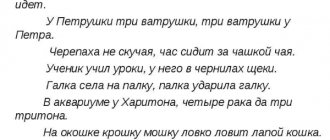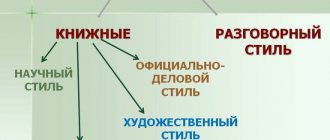Types and types of oratorical speeches
The problem of dividing oratorical speech into genera and types has a long historical tradition. Already in Aristotle's Rhetoric, deliberative, judicial and epideictic (praise) speeches are distinguished. The purpose of the former is to discuss the most important state issues: war and peace, finance, country security, legislation, food, etc.
The main task of judicial speeches is to clarify the truth, protect human rights and personal dignity. Epideictic speeches were made at anniversaries and celebrations. This classification of Aristotle has not lost its significance to this day, since any speech can be attributed to one of these three types of speeches.
Authors of domestic rhetoric of the 17th-18th centuries. called five main types of eloquence. At the royal court, in the noble salons, ceremonial secular court eloquence . In an army environment, in a wartime environment, military eloquence . diplomatic eloquence is gaining general recognition in Europe .
Popular eloquence is represented by the invocation speeches of the leaders of peasant uprisings. Centuries-old church traditions contain spiritual (church-theological) eloquence . Let us give a generic and specific classification of oratorical speeches, approved by modern Russian rhetoric.
This typology reflects the influence of ancient rhetoric, when the subject of attention was only oral oratory. Modern rhetoric studies types of eloquence that require written presentation of material within the framework of academic and socio-political eloquence. These include scientific report, scientific communication, scientific information, political review and other genres of writing. Let us show the features of the named oratorical speeches.
Social and political eloquence is a type of speech designed to reflect the social life of a country with its necessary political, economic, and everyday problems. This speech requires clear argumentation and clear political thinking. It must contain a huge mobilization force in order to call on the people to great achievements. Let us consider the types of eloquence included in this genus.
A report is a public speech on socio-political, political-economic, social, everyday, ethical and moral topics, as well as a speech on issues of scientific and technological progress. The report poses and solves current problems that have arisen in the political life of the country (territory, region). The speaker retains the right to make recommendations and propose solutions to clearly defined problems. Often the report becomes a kind of guide to action or the subject of general discussion.
As an example, let us give a fragment of the report of the Minister of Economic Development and Trade of the Russian Federation, German Gref, delivered in the State Duma in October 2006. I would like to conditionally divide my report into three parts. The first is the state of affairs with accession to the WTO; second - what significance does membership in this organization have for the country; and third, the measures necessary to be well prepared to enter this structure. Today there are one hundred and forty-nine countries in the WTO...
Negotiations on our membership have been completed with almost all countries except three. One of them is the United States of America... There are good chances to “close” all issues with the United States by the end of the year. The report, devoted to the issue of Russia's preparation for joining the World Trade Organization (WTO), caused a heated discussion among parliamentarians.
The reporting report provides an account of the work done, provides an analysis and assessment of its results, and sets new tasks. Let us refer to the report of the Chairman of the State Duma Boris Gryzlov, “The focus is on the socio-economic development of the country.” This speech took place at the close of the autumn session of 2005.
The main thing for the autumn session was the consideration of bills that determine the socio-economic development of the country. It is important for us that already at the stage of determining the macroeconomic indicators of the budget, the position of the deputies was taken into account.
As a result of our persistence, the Government clarified the macroeconomic forecast for 2006, which made it possible to increase both the revenue and expenditure parts of the federal budget. We have significantly increased the investment component and provided financing for priority national projects put forward by the President...
The importance of control over the expenditure of budget funds is increasing. Society, through the legislative body, has the right not only to influence the determination of priority budget objectives, but also to control their achievement. ...We have expanded the field for joint activities of the chambers of our parliament. We will continue to focus on increasing its role in the life of the country. This will certainly help to increase the responsibility of all government bodies to citizens.
As you can see, the report reflects the results of collective creativity. Thus, during the autumn session of 2005, the State Duma adopted two federal constitutional laws and 114 federal laws. The content of these documents allows us to talk about the Duma reaching a qualitatively new level of legislative regulation.
A political speech (for example, the president’s address to the people), as a rule, is delivered by the leader of the country and is programmatic. An example of oral public speech is the speech of Russian President V.V. Putin on solving national projects.
In October 2005, the President announced that starting from 2006, four national projects would be implemented in Russia: in the field of medicine, education, housing and agriculture. It is expected that large amounts of money will be spent on the implementation of these projects. Here is a fragment from the text of V.V.’s speech. Putin.
Today I would like to particularly focus on practical steps in the implementation of priority national projects in such areas as healthcare, education, and housing. We have returned to this topic many times. I consider it necessary to return to this problem once again.
Firstly, it is these areas that determine the quality of people’s lives and the social well-being of society. And, secondly, ultimately, the solution to these very issues directly affects the demographic situation in the country and, which is extremely important, creates the necessary starting conditions for the development of so-called human capital.
The speaker emphasized that a Council has been created to implement priority national projects so that they do not remain only good intentions. These projects are a course towards investing in people, and therefore in the future of Russia.
A diplomatic speech is an official speech by a representative of a state on pressing issues of international politics. Consequently, diplomatic speech is a type of political speech in which an official (representative) clearly and clearly states the position of his state.
Russian diplomats adhere to the policy of creating an international security system in a variety of spheres: political, economic, military, environmental, etc. Russian diplomatic speech sounds powerfully from the UN rostrum, from representative meetings and conferences.
Here is a fragment of the speech of the Minister of Foreign Affairs of the Russian Federation S. Lavrov, “The comparative advantages of the OSCE are being eroded.” This speech took place at the 12th meeting of the OSCE Council of Foreign Ministers in Sofia on December 7, 2004.
This year has been difficult for all of us; our countries have had to endure many difficult trials. The most dramatic ones were associated with new attacks of international terrorism in Spain, Turkey, Uzbekistan, Russia, as well as in a number of countries outside the OSCE (Organization for Security and Cooperation in Europe). The tragedy in Beslan was a monstrous catastrophe, where terror crossed the extreme line of meanness and cowardice, directing its actions against innocent and defenseless children.
Today we are adopting a Ministerial Statement condemning these acts of violence and a solid package of concrete anti-terrorism decisions. We are for further building up the anti-terrorist potential of the OSCE and expanding cooperation between states in countering modern threats... with regret we have to admit that “the comparative advantages of the OSCE are being eroded.”
The organization not only ceases to be a forum that would unite states and peoples, but, on the contrary, begins to work towards separation. In the Statement of the CIS countries dated July 3, 2004, and in their Address to OSCE colleagues dated September 15, 2004, proposals were made to rectify the situation. (This refers to regional conflict situations in Moldova, Georgia, South Ossetia.) The Appeal of the CIS countries contains a constructive concept for the development of the OSCE in the interests of all 55 participating states.
The future belongs to an organization that would really help all states solve their common problems and would be ready to provide practical assistance in the implementation of vital projects. In this case, it is necessary to take into account the cultural, historical, and national differences of all countries.
A military-patriotic speech is a speech given by a commander before a decisive battle. In this short conscription speech, the commander reminds the soldiers of their previous victories, shows the advantages of his soldiers over the enemy, and inspires them to fight. Reading the chronicles of Russia, one can come across rare examples of military eloquence.
Before the battle with the Greeks, Prince Svyatoslav made a speech, the winged words from which remained in the memory of the people: Let us not disgrace the Russian lands, but let us lie with those bones; dead and have no shame. During a battle, in the roar of battle, the commander not only encourages the soldiers, sometimes with one word he unites the scattered regiments, returning them to battle.
We can say that military-patriotic speech is both a call to personal heroism and an order that is not subject to discussion. This speech takes on special significance from the lips of a man known for his courage and military prowess.
The rally speech has rich historical traditions. It was born in an atmosphere of acute political events and class struggles. This speech has always been distinguished by its appealing nature, the rapid mobilization of forces to carry out specific actions. The variety of forms and types of rally speech is truly impressive: these are rallies of protest, solidarity, support, mourning and solemn rallies. Often the attributes of a rally include posters, slogans, banners and portraits.
Modern Russian rhetoric understands a rally speech as a public speech dedicated to a significant date or international event. Thus, on January 12, 2007, Russia celebrated the 100th anniversary of the birth of the founder of practical cosmonautics, chief designer of rocket and space systems, Academician S.P. Queen. In a city near Moscow, which was named after Korolev, a solemn meeting was held dedicated to the memory of the brilliant designer.
Advisor to the President of the Russian Federation Alexander Burutin said: This year we will also celebrate the 150th anniversary of the birth of Konstantin Tsiolkovsky, the 110th anniversary of the birth of Alexander Chizhevsky, and the 50th anniversary of the launch of the first artificial Earth satellite.
But the 100th anniversary of the birth of Sergei Korolev is the first date in this series of holidays, this is a significant event in the life of our state - a true leader in space exploration not only in history, but also today. Indeed, it is difficult to overestimate the contribution that Sergei Pavlovich Korolev made to the development of astronautics, which in turn brought all of humanity to a new stage of development.
In 1964, having been appointed the first head of the newly created OKB-1, Sergei Korolev in a short period of time created a powerful enterprise that became the leader of the world cosmonautics, united a team of like-minded people capable of solving the most complex problems in a limited time.
The achievements of Sergei Korolev and his team are known to everyone: the R-7 launch vehicle (the first intercontinental ballistic missile), which became the main means of launching spacecraft, the first artificial Earth satellite, the first human flight into space, the first automatic vehicles launched to the Moon and planets of the Solar system, the first satellites for scientific research, the first manned spacecraft “Vostok”... Today Korolev’s ideas have found a worthy continuation...
According to the law of the genre, a rally speech should be bright and emotional. Pathos in essence, with clear diction of the speaker, with rich intonations in its drawing, it should evoke a psychological response. It is very important to select new facts and present events so that they appear in a new light.
Propaganda speech is a public speech that contains calls for new action or abandonment of previously made decisions. Propaganda speeches set extremely specific goals: to vote, for example, for a candidate, to support an economic initiative, to respond to an advertising speech.
Propaganda speeches usually end with calls: Russians! Lead a healthy lifestyle!; Take part in a charity event!; Vote for the United Russia party! The success of a propaganda speech depends on the speaker’s ability to psychologically influence listeners.
Convincing examples and the sincerity of the speaker help achieve this. The propaganda speeches of our time do not contain calls to fight against enemies internal and external, against dissent and religious customs and traditions. Democratic Russia occupies a worthy place in the civilized world, so the content of the propaganda speeches of modern speakers distinguishes them from the “tribunes of revolutionary upheavals” of the early twentieth century. motto: “Propaganda speeches that serve the strengthening and prosperity of our state always find wide support among Russians.”
Academic eloquence contributes to the formation of a scientific worldview and the creation of a scientific picture of the world. It is characterized by strict scientific presentation, deep evidence, and logical culture. The term “academic eloquence” is very conventional, but this is what university lectures, scientific reports, reviews, reports, and popular science lectures have come to be called.
Advanced domestic scientists of the 19th century. brilliantly developed this type of eloquence. According to N.I. Pirogov, the lecture increasingly became “an aid to the mental work of listeners, an indispensable means of assimilating knowledge gleaned from nature and books.” Professor T.N. Granovsky considered the most important advantage of a lecturer to be “the ability to stir and stimulate the play of the mind.”
His speech never lost clarity, was not full of incomprehensible terms, and was distinguished by special artistic expressiveness. “So light, passing through a transparent crystal, without changing in its essence, plays with living colors,” I.S. characterized his speech. Turgenev.
Lectures by the Russian Darwinist scientist M.A. Menzbier has been compared to the style of productions of the Art Theater. Here is a fragment of one of his lectures. Where is all the diversity of marine forms, an inexperienced observer asks himself, about which they write and tell us? Where are the jellyfish, bladderworts, and ribeyes that amaze in the drawings with their grace? Where have the crabs gone, where to look for fish?
Like an old man in a Russian fairy tale, I cast a net, expect a rich catch, and it brings me nothing except scraps of seaweed. Not just a goldfish, nothing resembling any animal... Yes, a goldfish is not immediately given to a naturalist; the vast majority of sea animals have a transparent body and such a color that it takes a very experienced eye to see them in the blue of the sea... all these animals are affected by the law of protective coloring and protective similarity, only a few inhabitants of the sea are not subject to it.
The specificity of this excerpt from the lecture is peculiar: a fusion of scientific and colloquial elements creates expressiveness of speech and makes it attractive to listeners. The relevance of ideas, citizenship, a deep scientific analysis of each topic and emotionality, expressiveness of speech - all this was characteristic of the lectures of scientists of the 19th century. Thanks to the efforts of leading Russian professors, the lecture was no longer considered only as a way of orally transmitting scientific and educational information. The principle of understanding lectures as a method of developing independent thinking of students is affirmed.
One of the oldest types of oratory is judicial eloquence. A judicial monologue speech, delivered by a prosecutor and a lawyer in court debates, is a type of public speech that is designed to have a targeted and effective impact on the court, to form the beliefs of judges and citizens in the courtroom.
It is necessary to take into account the fact that the prosecutor performs his duties at the level of official duty and is not subjectively interested in the outcome of the case. The defense attorney is personally interested in the results of the investigation, since the defendant “hires” him. In principle, the prosecutor and the lawyer must match each other in intelligence, social status, and level of education. A lawyer has a number of advantages over a prosecutor.
The prosecutor only asserts what has been proven and confirmed by the investigation. A lawyer can deny everything that has not been factually established and therefore gives rise to doubts. An experienced lawyer, avoiding spectacular scenes, offers his own approach to assessing events and gives his understanding of what was done.
In judicial practice, a correctly started speech already half determines the success of the case. Thus, N.P. began his speech convincingly. Karabchevsky, speaking in defense of K.K. Kriun, captain of the sunken steamship Vladimir. The tragedy on the Black Sea occurred on the night of July 27, 1894, as a result of a collision between the steamer Vladimir and the Italian motor ship Columbia, seventy passengers, two sailors and four members of the ship's staff were killed on the Russian ship. In his introduction, the lawyer stated the following.
Gentlemen judges! The public significance and interest of the trial about the death of “Vladimir” goes far beyond the narrow confines of this courtroom. The picture of the event we are studying is so deep in its content and so sad in its consequences that may I be allowed, at least for a minute, to forget about the practical goals pursued by each of the parties in this trial.
You have to do not easy and, moreover, not mechanical, but purely creative work - to recreate the incident in the form in which it corresponds to reality, and not to the imaginary circumstances of the case. Here, in the introduction, the speaker called on the court to take into account the historical and everyday truth that the investigation had revealed, and not to worry “only about gross effects and nerve-wracking impressions.”
The main content of a defense speech requires a detailed analysis of the factual material, an assessment of all the arguments for and against, and the characteristics of the accused himself. The experienced lawyer Karabchevsky took all this into account and won the case. For an experienced lawyer, it was not so much the facts that were important, but their relationship. This is always the center of gravity in judicial protection.
Judicial speech is characterized by a combination of standard and emotionally expressive means of expression: the use of standard legal terms and formulas, argumentation, persuasiveness and emotionality. Russian judicial eloquence of the second half of the 19th century. was a significant phenomenon in the social life of Russia. Thanks to the efforts of many remarkable judicial figures in Russia, a special theory of judicial eloquence was created.
Social and everyday eloquence is inseparable from established folk traditions and customs; as a rule, it is imbued with high ideas and feelings. This includes speeches: anniversary, dinner, funeral.
An anniversary speech is usually associated with significant dates in the life of the country, the workforce, or an individual. A table speech, which is delivered at official, for example, diplomatic receptions, has a strict status and is close in style to socio-political eloquence.
An anniversary speech can be dedicated to an individual, for example, in connection with his 50th birthday and 30th anniversary of scientific or artistic activity. Such a speech should be short, elegant, light: after all, it is pronounced in a solemn and friendly atmosphere. As an example, let us give an excerpt from the speech of the poet E.A. Yevtushenko at the anniversary of composer A.Ya. Eshpaya, delivered in May 2005
Andrey Eshpai belongs to a rare type of people who do not age at all over the years. In his whole appearance there is something eternally youthful, excited, more concerned about tomorrow than today; the ponderous “solidity” of many of his peers and even people younger than him has not been grafted onto him. Why? Yes, because, despite the necessary and unnecessary public employment, the main thing for him was and is music - the poetry of his life.
It is difficult to imagine, looking at his changeable, mobile, somewhat boyishly defenseless face, that he walked along the terrible roads of the front. He managed not to grow old either under the bullets or under the weight of the many awards that weighed down his lapels. He is characterized by an impetuous mosaic of actions, a nervous but grasping mosaic of creativity - from complex symphonic structures to the most complex simplicity of immediately memorable song melodies. The breadth of the creative range of the composer-celebrator is impressive.
The impressive list of his works includes a wide variety of genres: ballets “Angara” and “Circle”, symphonies, concerts for almost all instruments with orchestra, operettas, “Hungarian Tunes” for violin and orchestra, program orchestral pieces, chamber ensembles, piano cycles, songs , music for films and plays...
In the speech of Yevtushenko, who created many popular songs in collaboration with Eshpai, a high evaluative text prevails, which meets the requirements of the genre. Solemn speeches are not characterized by a strict plan of presentation and a comprehensive characterization of the individual. Only the positive, best aspects are emphasized. This is a typical eulogy. Impromptu and impromptu speeches are especially valued. Anniversary speeches, similar to reporting reports, evoke a feeling of bewilderment and annoyance in listeners.
Table speech , delivered at official receptions, is often of a business and political nature and is not much different from socio-political eloquence. But in a relaxed, friendly atmosphere, it is presented in a different way: a toast is an example of such a praiseworthy word.
Brevity, aphorism, and elegance of style distinguish this genre. For a toast, exaggerations in assessments and praise are appropriate, but critical hints and satirical notes are “prohibited.” The toast is always full of humor, full of fun and heartfelt wishes for goodness and success. The theme of a good toast should be revealed in the final phrase, which will keep the audience's attention. This is what actor Alexander Shirvindt said when greeting his colleague on his anniversary.
Friends! Allow me to raise, in this case speculatively, this symbolic glass to the charming decoration of our lives - to Zinovy Gerdt. In the era of the great victory of amateurism, any manifestation of high professionalism looks archaic and implausible. Gerdt is a militant all-round professional.
I sometimes think, watching him: who would Gerdt be if he had not become an artist? If he had not been an artist, he would have been a brilliant carpenter or surgeon. Gerdt's hands holding a plane or an ax are skillful, strong, masculine - an archaeological rarity in our infantile age. Beautiful Gerdt hands - the hands of a master, the hands of an artist.
If he were not an artist, he would be a poet, because he is not only a deeply poetic nature, but one of the few people I know who does not learn poetry, but absorbs it into himself like some kind of nectar... If he were not an artist, he would be a wonderful pop parodist, subtle, friendly, accurate. It’s not for nothing that out of a million of “his” doubles, L.O. Utesov adored Gerdt. <…>
If he were not an artist... But he is an Artist! An artist given by God, and thank God that with all the professional “combinations” of this stormy nature, he (God) was pleased to give Gerdt to Melpomene and other gods accompanying art. <…> It is naive to wish Gerdt creative success - he is the embodiment of success. Let's go advocate for eternal youth - he is younger than thirty. We must wish that we all help him, not irritate him, take care of him, so that, God forbid, he does not become upset by being disappointed in us, those for whom he lives and works.
In the circles of the domestic intelligentsia, serious importance has always been attached to the forms of speech accepted in the family and in society. Discussions about “good manners” look like a historical fact of the family and social life of a person of a bygone era. Here is how the definition of good tone is given: “Just as in music all pleasant and caressing sounds, merging into one, form a harmony, the enchanting influence of which we involuntarily succumb to, in the same way we are unconsciously attracted by sympathy for that person who has everything in him. Complete harmony reigns in movements, conversation, and demeanor. This is the good form that every educated person should strive to master and achieve.”
Good tone is associated with such human qualities as politeness, tact, attentiveness and delicacy in communication, the ability to listen and respond. Consequently, strict etiquette of speech is highly valued in rhetoric, which is so lacking in our modern society.
A funeral or funeral speech is given in memory of a person who has passed away. It is customary to “remember the deceased with kindness.” The funeral eulogy always contains sadness and a brief description of the person who has passed away. Let us give an example of such a speech by the famous scientist-philosopher V.F. Asmus, who spoke at the funeral of the poet Boris Pasternak, who always lived according to the laws of truth and whose work became part of the cultural heritage of Russia.
Boris Leonidovich Pasternak, one of the greatest Russian writers, has left us. He was distinguished by enormous poetic talent, mastery of Russian poetic speech, rare not only in breadth of coverage, but also in accuracy, in insightful artistic sensitivity to all types of art: music, sculpture, painting, stage art.
It was not only this talent that made him a great writer. What made him a great writer was his desire and ability to speak in the language of his art about what he considered most important for man and for the artist: he demanded both from himself and from his fellow artists that art should not be fun, not pleasure, not honing mastery for the sake of mastery, and by clarifying—to oneself and through one’s art—to other people the special understanding of the phenomena of life that was revealed to the writer.
He subordinated his talent and skill to this task with an unyielding will. He did not demand anything from others that he did not demand for himself... This trait places Pasternak next to the most remarkable Russian writers, such as Lermontov, Dostoevsky, Leo Tolstoy...
Pasternak argued with modernity. However, his dispute with modernity was never that of an embittered conservative. This was, of course, not a dispute with our government and not even a dispute with our entire era. It was a dispute with a whole series of eras, whose people and leaders believed that humanity could only reach a better future through struggle and violence.
Pasternak could not accept this idea. He became one of the utopian writers, deniers of violence, like Leo Tolstoy, for example. This idea can be considered deeply erroneous, but it was the delusion of a man in whom a huge warm heart beat, who actively loved suffering humanity and who - to his misfortune - could not understand how, from the intensification of the struggle, from the sea of blood, from moral savagery, coarsening and the dullness that has hitherto accompanied the great historical upheavals, a harmonious, overcoming contradictions, the highest state of human morality and the highest flowering of culture can be born. <…>
He loved his homeland - its nature, its great spiritual culture, its great people: artists, writers, musicians. In his autobiographical works, he wrote - as always, concisely, sparingly, purposefully - a few pages in number about Leo Tolstoy, Scriabin, and Blok. It will not be long before images of these artists appear that are equal to Pasternak’s in their ability to capture.
This understanding and this vision must have hurt, giving rise to a feeling of some kind of inconsistency, trouble in what so closely concerned not only him personally, but - through him - art. All the more amazing is the courage, modesty, dignity, and patience with which he met and endured his difficult fate in literature. He did not impose himself on modernity, did not argue with it, because he respected it and firmly knew that the time would come when modernity would turn to him again. That time is just around the corner.
Spiritual eloquence is sometimes called church-theological eloquence, since this type of eloquence is based on the presentation and development of religious and moral themes. The first name for modern rhetoric is more justified: the phrase spiritual eloquence emphasizes the high focus of the topic (about mercy and the salvation of the soul, thinking about the eternal, about good and evil, love and hatred, honor and baseness). In the history of Russia, this type of eloquence has long and rich traditions. It was the introduction of Christianity in Rus' that served as the basis for the formation of this rhetorical type of literature.
In church speeches, in essence, a moral guideline for the correct way of life was always given. Pride, anger, love of money, hypocrisy, talkativeness were considered vices, “sins”; mercy, hard work, a sense of love for the Motherland, and a sense of national identity were glorified.
The Church in Rus' not only carried within itself the Speech of V.F. Asmus at the funeral of B.L. Pasternak, spoken at the cemetery in the writer's village of Peredelkino on June 2, 1960, a high spiritual charge, it formed a “peculiar school” of godly (righteous) life. The science of Christian church preaching - homiletics - studies spiritual eloquence.
Talented examples of spiritual eloquence include: “The Sermon on Law and Grace” by Hilarion (11th century), the sermons of Cyril of Turov (12th century), as well as the Patriarch of Moscow and All Russia Pimen (20th century), Patriarch of Moscow and All Rus' Alexy II (XXI century), priest Alexander Men (XX century). Today, when moral guidelines are being lost in society, the preacher’s word acquires exceptional power and significance.
As an example, let us give a fragment from the sermon of the Orthodox priest and writer Dmitry Dudko “On the Resurrection of Our Souls,” which he delivered to students at one of the schools in Moscow. For our faith to be the subject of the resurrection of our souls, we must believe and do good deeds.
St. Sergius, whose relics we are discovering today, believed. When there was not enough food in the monastery and the brethren began to grumble, demanding to break the law of the monastery (and the law of the monastery was not to ask, but to wait for God’s mercy), St. Sergius prayed, and the Lord sent a benefactor for the monastery.
Living in the monastery, St. Sergius not only left everyone, but in his heart he felt the need of all people, the need of society. At that time, Russia was experiencing a foreign yoke, and he blessed Dimitri Donskoy for victory over Mamai. Here he is - a living example of how to resurrect souls!
A speech at a council is another type of spiritual eloquence, addressed only to church ministers. The subject of such speeches is internal church problems related to religion. You have noticed that each type of eloquence is distinguished by its specific linguistic features. The speaker’s speech is tailored to the situation and the composition of the audience. It should be noted that oratory has never been homogeneous. Various kinds and types of oratory have historically been distinguished depending on the specific scope of application.
To be successful in public speaking, the speaker must, first of all, capture the attention of the audience and force them to listen to themselves. However, achieving this is not easy, and success depends not only on the speaker himself (his abilities, professionalism, preparedness), but also on objective factors that the speaker cannot influence.
In a democratic society, a speaker can speak freely and develop his full gift of eloquence. But in a totalitarian regime, the main reason for the lack of contact between the speaker and the audience is the social structure of society. The speaker turns into a reasoner who voices the directives of higher authorities, and the listeners become a passive crowd, doomed to unquestioningly follow the instructions of the governing bodies.
The speech of the speaker and power is a problem that has been considered in rhetoric since antiquity. The forms of speech accepted in society directly depend on the forms of power. The totalitarian state imposes monologue (from the Greek monos - one, logos - speech) as a form of speech that corresponds to its own structure.
“ Monologue in speech ,” writes A.K. Michalskaya, is not only a manifestation of the power of the speaker over the listener, the possession of the addressee as a thing, as an object of influence. This is also a claim to possess the truth, a desire to master the truth individually. Such were the monologues of the people who came to power, such were their speeches, the forms of which reflected power.”
The rhetoric of power gives rise to categorical, authoritarian statements that do not allow objections and are binding on everyone. The rhetoric of power does not need to explain its postulates; they must be accepted unconditionally. The universal binding nature of the judgments expressed by the speaker is designed for their dogmatic perception by the listeners, which excludes intellectual and emotional empathy.
Live communication with the audience becomes unrealistic for the speaker ; he must speak according to a text prepared in advance and approved by the relevant authorities, deviations from it are unacceptable. This depersonalizes the speaker, or rather the reader, the “speaker,” who is deprived of the possibility of self-expression and any manifestation of uncontrolled free-thinking.
The relationship between speaker and audience is different in a democratic society that guarantees freedom of speech and provides the speaker with the opportunity to creatively prepare his speech, think about how to make it interesting for listeners, and how to win their attention.
Properties of public speaking
Various public speaking skills are developed in the process of relevant classes and trainings, and their manifestation is public speaking, which has the following basic properties:
1) special structure of speech , the relationship between linguistic and non-linguistic (facial expressions, gestures) means of persuading the audience;
2) the focus of the speech on obtaining a response from the listeners, since its goal is not simply conveying information, but persuasion;
3) effectiveness , depending on the psychological mood and state of the speaker, his authority in the eyes of the public.







